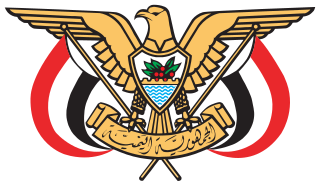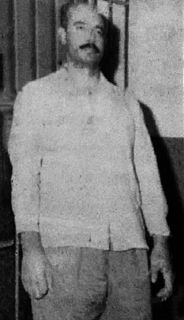Related Research Articles

Yemen is a one party dominant state in which the General People's Congress (GPC) holds power.

Janata Dal (United) abbreviated as JD(U) is a centre-left Indian political party with political presence mainly in eastern and north-eastern India. JD(U) is recognised as a state party in the states of Bihar and Arunachal Pradesh and is a part of government in Bihar. JD(U) heads the government in Bihar and is the second largest party in Arunanchal Pradesh. JD(U) won 16 seats in the 2019 Indian general election, making it the seventh largest party in the Lok Sabha. The party operates on the ideologies of socialism, secularism and integral humanism.

The National Progressive Unionist Party is a socialist political party in Egypt. Originally known as the National Progressive Unionist Organization, it was established as the left-wing faction of the governing Arab Socialist Union (ASU) and became an independent party after ASU's dissolution.
The Arab Democratic Nasserist Party is a Nasserist political party in Egypt, styling itself as the ideological successor of the old Arab Socialist Union party of Egypt's second president, Gamal Abdel Nasser.

Nasserism is a socialist Arab nationalist political ideology based on the thinking of Gamal Abdel Nasser, one of the two principal leaders of the 1952 July movement and Egypt's second President. Spanning the domestic and international spheres, it combines elements of Arab socialism, republicanism, nationalism, anti-imperialism, developing world solidarity and international non-alignment.

Elections for the Shura Council, the upper house of the Egyptian parliament, was held in Egypt on 11 June 2007 and 18 June 2007. From a total of 264 seats 88 are up for election every three years, another 44 are appointed by the president.

The 1963 Syrian coup d'état, referred to by the Syrian government as the 8 March Revolution, was the successful seizure of power in Syria by the military committee of the Syrian Regional Branch of the Arab Socialist Ba'ath Party. The planning and the unfolding conspiracy was inspired by the Iraqi Regional Branch's successful military coup.

The Dignity Party is an Egyptian left-wing Nasserist political party founded in 1996. The current leader of the party is Mohamed Samy.

Hamdeen Sabahi is an Egyptian politician, journalist and poet. He is currently the leader of the Egyptian Popular Current and a co-leader of the National Salvation Front. An opposition activist during the Anwar Sadat and Hosni Mubarak eras, Sabahi was jailed 17 times during their presidencies for political dissidence. He was an immediate supporter and participant of the 2011 Egyptian revolution. Sabahi entered the 2012 Egyptian presidential race in which he finished third place with 21.5% of the vote trailing the second place candidate Ahmed Shafiq by a margin of 700,000 votes. In the 2014 presidential election he was one of just two candidates. He ran second with less than 4% of the vote. Abdel Fattah el-Sisi was declared the winner after attracting 22 million of the nearly 23 million votes cast. Sisi sworn into office as President of Egypt on 8 June 2014.
The National Salvation Front is an alliance of Egyptian political parties, formed to defeat Egyptian President Mohammed Morsi's 22 November 2012 constitutional declaration. The National Front for Salvation of the Revolution has more than 35 groups involved overall. Observers are concerned that the NSF will not be able to become a coherent political force because the different parties agree on opposing Morsi, but their views on other subjects diverge.

Jassem Alwan was a prominent colonel in the Syrian Army, particularly during the period of the United Arab Republic (UAR) (1958–1961) when he served as the Commander of the Qatana Base near Damascus. Alwan, a staunch supporter of UAR President Gamal Abdel Nasser, opposed Syria's secession from the union in 1961, leading two failed coup attempts to overthrow the secessionist government in 1962.
The Arab Nationalist Movement, also known as the Movement of Arab Nationalists and the Harakiyyin, was a pan-Arab nationalist organization influential in much of the Arab world, particularly within the Palestinian movement. It was established in 1952 by George Habash.
Amin Iskander is an Egyptian politician, writer and activist. He is the co-founder, along with Hamdeen Sabahi, of the Dignity Party (Al-Karama) and is currently a member of the People's Assembly. He is considered a veteran Nasserist and a long-time advocate of pan-Arab unity. He has authored several books specializing in Egyptian and Arab politics. He is a resident of Shobra and a Coptic Christian.
Muhammad al-Sufi is a former field marshal in the Syrian Army, who played a role in the 1963 Syrian coup d'état and briefly served as Defense Minister between March and May of that year. Politically a Nasserist, he was sidelined by Ba'athist rivals in the military and departed the political scene before returning to Syria in the 1990s.

Abd al-Wahhab Hawmad was a Syrian politician, lawyer, criminologist and professor.
Hossam Eisa is an Egyptian politician and academic. He served as deputy prime minister and minister of higher education of Egypt from July 2013 until 1 March 2014.

Kamal Abu Eita is a long-time Egyptian trade unionist and former government minister. As a civil servant at the Real Estate Tax Authority, Abu Eita led a successful struggle for trade union autonomy against the state-controlled Egyptian Trade Union Federation (ETUF) during the Mubarak regime. A prominent figure during the 2011 Egyptian Revolution he helped found the country's first independent union confederation, the Egyptian Federation of Independent Trade Unions (EFITU). Elected to the People's Assembly following the democratic parliamentary election of 2011-12, Abu-Eita served as Minister of Manpower and Immigration between July 2013 and March 2014.
References
- 1 2 3 4 "Nasserist parties to merge". Daily News Egypt . 16 January 2013. Retrieved 16 January 2013.
- ↑ "June 30 Coordinating Committee plans for week-long protests". Ahram Online. 22 June 2013. Retrieved 18 July 2013.